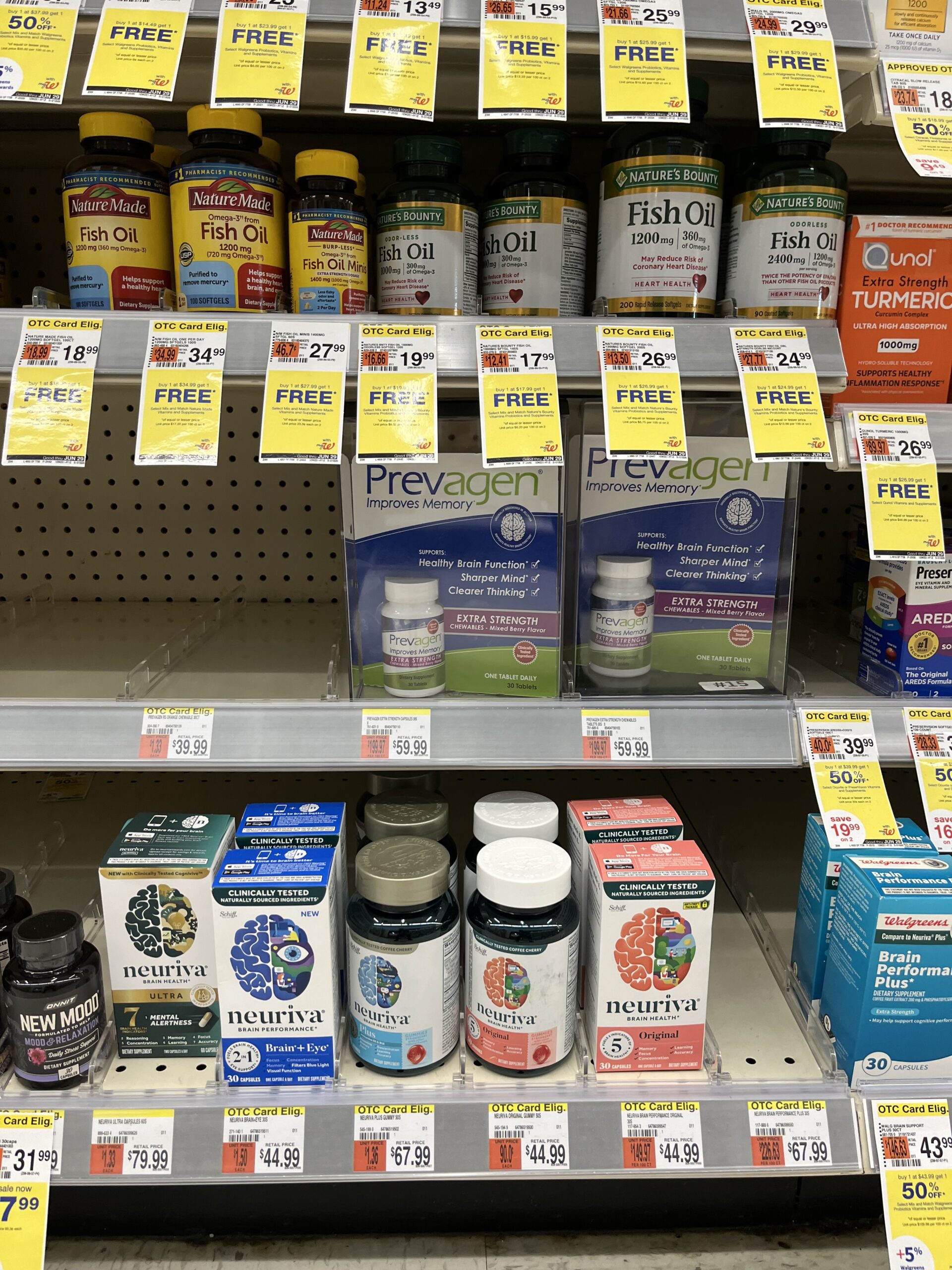Consumer Diary: Prevagen

Audio By Carbonatix

At Walgreens at Bishops Corner a clerk said Prevagen sells “really well. It’s popular.” Photo credit: Harlan Levy
Consumer columnist and West Hartford resident Harlan Levy has more than 20 years of experience writing stories about everyday experiences that anyone could encounter.

Harlan Levy. Courtesy photo
By Harlan Levy
The ubiquitous TV ad that I’m watching for supposed memory and brain enhancer Prevagen features senior citizens testifying that the over-the-counter supplement “with an ingredient originally found in jellyfish” has cleared up their brain fog and improved their thinking and memories.
I’ve got to admit I just don’t believe it, and I think the campaign is just one more effort to rip off gullible old people, desperate to regain a semblance of their youthfulness.
But is it?
I did some research and talked to a handful of doctors, all of whom doubted Prevagen’s claims but would not go on record, because they hadn’t the requisite expertise. But here’s what the authors of three in-depth analyses had to say:
Harvard Health Publishing:
“The main ingredient in jellyfish (apoaequorin) has no known role in human memory, [and] many experts believe supplements like this would most likely be digested in the stomach and never wind up anywhere near the brain,” said Harvard Health’s Dr. Robert Shmerling in his report … and “online for $1 to $2 a day.”
How can the manufacturer make these claims? he asks. “And if apoaequorin is so great, why aren’t jellyfish smarter?”
A bar graph shows a rise from 5% to 10% to 20% over 90 days in “recall tasks,” Shmerling writes, “but there’s no way to know what these numbers refer to, how many people were studied, or other important details. And no information is provided about effects on memory after 90 days.” This study’s authors recommended additional study to clarify the effectiveness of apoaequorin, but additional, high-quality studies have not been published.
Meanwhile, The Federal Trade Commission and the New York State attorney general charged the manufacturer Quincy Bioscience with false advertising in 2017. In February 2024, a New York jury found many claims were not supported by reliable evidence and some of the claims were “materially misleading.” The FTC lawsuit was finally settled in 2020 with cash refunds to purchasers. The settlement allowed Quincy to continue marketing Prevagen provided it qualified its advertising claims with a court-approved disclaimer.
Under federal rules, supplement makers can make general claims about connections between their supplement and the body’s “structure and function” if, in fact, there is some evidence. For instance, a calcium supplement maker can say it’s good for bone health, since calcium is, in fact, important for bone health. But it cannot claim its product treats or prevents a particular disease.
Consumerlab.com:
Prevagen’s disclaimer states that it “improves memory” and “supports: healthy brain function, sharper mind, clearer thinking” and indicates that those statements are “based on a clinical study of subgroups of individuals who were cognitively normal or mildly impaired.”
However, this report says, “There is little evidence that Prevagen provides any meaningful benefit in terms of memory improvement, and the extent of potential improvement appears to be minimal.”
The main ingredient in Prevagen is apoaequorin, discovered in jellyfish (10 mg per capsule, taken once daily), now apparently produced synthetically by genetically modified bacteria. Quincy says apoaequorin can help protect brain cells by binding to excess calcium, which might damage or destroy the cells, which can impair memory. “But there do not appear to be any studies that show apoaequorin, when taken orally, reaches the brain, or binds to enough excess calcium to reduce the risk of brain cell damage,” the Consumerlab report states, adding that “the FDA has also warned Quincy Bioscience that the agency considers synthetic apoaequorin a ‘new drug’ and therefore not an acceptable ingredient in a dietary supplement.”
Indeed, Prevagen’s “clinical studies” do not provide clinical evidence that Prevagen protects brain cells or improves memory, and two of the three clinical studies cited have not been published in a peer-reviewed journal. One study reported that people who slept fewer than seven hours a night and took Prevagen daily – without specifying the dosage – for three months increased their sleep by an average of 37 minutes.
Another of Prevagen’s clinical studies found that men and women (average age 62) with self-reported memory “concerns” who took one 10-mg capsule of Prevagen daily for 3 months showed no overall benefit. The authors of the published study were employees of Quincy Bioscience, raising questions of bias.
AARP:
Quincy Bioscience is “deceiving millions of aging Americans” with claims that the supplement can treat age-related memory loss, AARP said in a new brief supporting a federal false advertising lawsuit.
And in a March 2024 a jury verdict in a case the state of New York filed against Prevagen found that eight statements, including “Prevagen improves memory” and “Prevagen improves memory within 90 days” lacked support by competent and reliable scientific evidence.”
“The statements Quincy Bioscience makes to sell Prevagen – that it treats memory loss – are unsubstantiated and misleading,” said senior AARP attorney Julie Nepveu, quoted in the AARP report. “Supplement companies have keyed into the idea that older people are going to spend a ton of money on their products because they want to feel better.”
In response, Quincy Bioscience said the case “is another example of government overreach and regulators extinguishing innovation by imposing arbitrary new rules on small businesses like ours.”
The cost for a one-month supply: $39.95 for regular strength (10 mg – the dose used in the studies above), $59.95 for “Extra Strength” Prevagen (20 mg), and $89.95 for “Professional Formula” Prevagen (40 mg).

At CVS at Bishops Corner Prevagen is kept behind the counter, because it’s expensive, “and people were stealing it,” a clerk said. Photo credit: Harlan Levy
At Walgreens at Bishops Corner, a clerk said, “I used to use it because I was studying in school. A lot of customers buy it. It’s very popular. It sells very well.”
At CVS at Bishops Corner, Sara, a clerk, said that it sells fairly well but not a lot of it. “It’s kept behind the counter,” she said, “because it’s expensive, and people were stealing it.”
NOTE: If you have a consumer problem, contact me at [email protected](“Consumer” in subject line), and, with the power of the press, maybe I can help.
Like what you see here? Click here to subscribe to We-Ha’s newsletter so you’ll always be in the know about what’s happening in West Hartford! Click the blue button below to become a supporter of We-Ha.com and our efforts to continue producing quality journalism.




Well researched and thought-provoking, thank you!